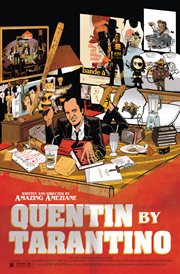Review by Booklist Review
In this cathartic story collection from Herbert (The House of the Pain of Others, 2019), readers meet a Shakespearean cast of characters on the wild fringes of a raucous society. There's a ghost writer of autobiographies, who keeps peoples' memories and trauma alive in his own mind. A crackhead tabloid journalist with a myriad of illegal side hustles. A team of medical-forensics assistants who blur the lines between science and religion when approaching a crime scene. One story tells of a father who stars in acrobatic porn films with disabled or ill partners. Another follows a conceptual artist who wakes up with sheet music in his teeth. This particular story is multimedia, including actual dental selfies as well as the aforementioned musical composition. The titular story has Tarantino himself leaping out of every detail: a cartel leader who happens to be a Tarantino doppelgänger orders a bounty on the filmmaker's head; the backstory for this murder for hire is lengthy and rife with gun and sexual violence. Explosive, visceral, and impossible to forget.
From Booklist, Copyright (c) American Library Association. Used with permission.
Review by Publisher's Weekly Review
The playful, surreal collection from Mexican writer Herbert (Tomb Song) evokes a version of contemporary Mexico where pretentious critics and conceptual artists rub up against ultra-violent drug cartel leaders. In the title story, a cheerfully verbose film scholar and Tarantino fan is kidnapped by a drug lord who looks exactly like the director and wants Tarantino dead, but not before learning as much as he can about Tarantino from the narrator. Those who know how to manipulate words and ideas tend to come out on top, such as the ghostwriter in the wry and scatological "The Ballad of Mother Teresa of Calcutta" who conceives a fiendish plan to punish the clients who neglect to pay him. Herbert ventures into fantasy in several of the stories, including the dark "Z," in which most of the population of Mexico City--apart from the narrator and a few others--is in one stage or another of turning into "nascent vegetal man-eaters in a perpetual and pestilential state of putrefaction." While not for the faint of heart or weak of stomach, Herbert's stories use a light touch to explore the dilemma of the intellectual enmeshed in a crudely vicious world. This provocatively cerebral volume should amuse those with a taste for literary horror. (Nov.)
(c) Copyright PWxyz, LLC. All rights reserved
Review by Library Journal Review
One thing you can say about rising-star Mexican author Herbert (Tomb Song): he absolutely nails sour, blustery men who lack idealism and gravitas and aren't as cool as they believe yet instinctively feel passed by. The results are both entertaining and corrosive, disturbing and socially relevant, sordid and sleekly accomplished. A consultant who packages personal memoirs explains how he reworked the story of a disgraced Mexican businessman, with both the real and manufactured versions unpalatable in different ways. A performance artist who films himself having sex with HIV-positive prostitutes scorns his family and spouts troglodyte values ("I hate LGBTQ activists: they are all just closet nuns") while admitting he's doing it for the money. As with many of Herbert's characters, his cynicism is almost refreshing; he's one-upping corporate greed and elite conceit. VERDICT Both author and characters see how far they can go (pretty far) in an edgy collection that will be a lightning rod for venturesome readers.
(c) Copyright Library Journals LLC, a wholly owned subsidiary of Media Source, Inc. No redistribution permitted.
Review by Kirkus Book Review
A gathering of often loopy, sometimes Rabelaisian stories by Mexican postmodernist Herbert. Herbert, lead singer in a rock band in Saltillo, Mexico, is a deft explorer of the darker corners of Mexican society: His characters smoke crack, have unprotected sex with HIV-positive partners while making "gonzo porn movies," drink far too much, exhibit poor manners. One even throws up on Mother Teresa, "a thick stream of puke composed of partially digested clams and wine that falls onto the extended hand and spotless headdress of the damned old witch crammed to the brim with lepers." It's decidedly not the polite, elevated world of Carlos Fuentes, and its layerings are less those of social class, as with Fuentes, than of degrees of criminality. In one story, for instance, a journalist seeking a source of funding for his crack habit of "between twenty and thirty rocks a week" engineers a speaking gig in a border town in a scheme that comes to involve the Secretariat of Public Education, the mayor, and a host of other figures--and, in the end, a lot more money than the journalist ever dreamed of. The story ends in a spasm of violence, the journalist in hiding, living with "a toothless junkie twenty years my junior." The title story is a tour de force of unlikely circumstance in which a hapless film critic is press-ganged into a mission to decapitate the famed director for an inadvertent error involving the doppelgänger of a fearsome cartel boss. Punctuated by passages in which the critic spins out a theory of parody that involves such highbrow figures as Hermann Broch and Harold Bloom, the yarn eventually finds that boss, Jacobo Montaña (think Scarface), in jail and his henchmen Rosendo and Gildardo (think Rosencrantz and Guildenstern) dead. As with a Tarantino film, the explanation for how all that has come about is serpentine, goofy, and good fun, if spattered with blood, all pushing the envelope of probability. A writer worth seeking out, even for Tarantino aficionados. Copyright (c) Kirkus Reviews, used with permission.
Copyright (c) Kirkus Reviews, used with permission.



